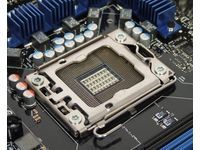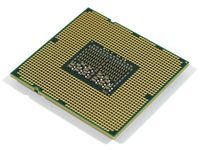UPDATE: Core i7: Blazing Fast, O/C Changes

Introduction
Chris Angelini: When this story was published on November 2, 2008, the results of our testing were reported accurately given the Intel platform available to Bert Toepelt, the author in our German lab. Since this piece went live, I have spent hours with different X58 platforms in an effort to help clarify the issues originally encountered in preparing for this story. As such, we’ve made changes to the piece, which you’ll find either in bold text or noted in the story itself.
Eight Virtual Cores Through Hyper-Threading
Just as Intel’s Core 2 has firmly established itself in the market, it is already being replaced by a completely new architecture. Unlike the switch from the Pentium 4 / Pentium D to the Core2—where the new CPUs worked as drop-in replacements on existing boards due to the fact that the processors were pin-compatible—Intel’s newest chip requires a completely new "ecosystem." But this transformation represents nothing less than a milestone for Intel.
Here’s the short version. Intel is introducing the Core i7, the successor to the Core 2 processor, which features both improved performance and higher efficiency. In our benchmark suite, the Core i7 is 16% faster clock-for-clock than the Core 2. Although all standard models are equipped with an overclocking lock, most motherboards will give enthusiasts the means to circumvent this mechanism, which Intel claims is in place to protect notebooks, servers, and other environment highly sensitive to heat. Since Intel is re-introducing Hyper-Threading to its desktop CPUs in the Core i7 line, the new processors show a marked performance boost in many modern multi-threaded applications. However, the Nehalem platform will not offer improvements where power consumption is concerned.

Simultaneously switching to Socket 1366, the X58 chipset, and a tri-channel DDR3 interface, Intel is once again launching both a new generation of processors and an entirely new platform complete with a corresponding leap in performance. The last time we saw a performance improvement of this magnitude was when Intel moved from the Pentium 4/D line to the Core 2 architecture. The new integrated memory controller offers much higher throughput and is even superior to AMD’s solution on the desktop. The Core i7 is going to leave Intel’s rival AMD lagging even further behind.
Socket 1366

As a result of the integration of the memory controller directly into the CPU, Intel’s Core i7 now also sports data links to the memory modules. Other links have been affected by Intel’s transition from a front side bus interface to the QuickPath Interconnect solution. Intel has increased the number of pin connections from 775 to 1366, necessitating a new socket aptly named LGA1366. The mounting mechanism continues to use the same design, though. A frame covers the CPU and presses it into the socket, locking it in place with a small lever. This design is larger than the Socket 775 version, and obviously has the pins in a different arrangement.
However, the new Socket 1366 also comes with one disadvantage: the spacing between the mounting holes for the coolers has increased, meaning you’ll need a larger cooler and a new mounting clip or retention module when you make the switch. As a result, no Core 2 CPU is compatible with any Core i7 boards and vice versa. On the plus side, a cooler is included with the boxed version of the processors.
Stay on the Cutting Edge
Join the experts who read Tom's Hardware for the inside track on enthusiast PC tech news — and have for over 25 years. We'll send breaking news and in-depth reviews of CPUs, GPUs, AI, maker hardware and more straight to your inbox.
Current page: Introduction
Next Page Size Comparison--Bigger Die, Fewer Transistors-
pullmyfoot AMD’s HyperTransport protocol can transmit up to 25.6 GB/s at 3.20 GHz.Reply
You mean Intel don't you? Other than that little mistake, good article
-
wh3resmycar hmm, question. once this nehalems come out. will we ever see a dieshrunk c2q again after the penryns? im expecting the price of this procs along with the mobo and ram to be too far off from my budget. orReply -
skywalker9952 One of the first side effects of Intel's domination of the CPU market is beginning to show. Since they don't have to compete with AMD in any market segment the i7 occupies, they have limited (significant) overclocking to only extreme models.Reply
RIP AMD.
May Abu Dhabi restore you to life soon so we don't have to suffer through more Intel ripoffs. -
sonar610 "The fastest Core i7, the 965 Extreme, is more than 2.6 times as fast as AMD’s current flagship CPU, the Phenom X4 9550 BE."Reply
This seems like an editing mistake maybe it should be 9950BE. -
cryogenic Core i7 is a great CPU, the article is not. I can't believe after all this time you still stack overclocked CPUs with unoverclocked ones. It's great to find out the overclocking potential of Nehalem but, at least include some overclocked Penryns in there too, to see how overclocked Nehalem stacks agains OTHER overclocked CPUs, because it's fairly evident that and overclocked new gen CPU will stack well with older non overclocked ones.Reply
-
joseph85 CryogenicCore i7 is a great CPU, the article is not. I can't believe after all this time you still stack overclocked CPUs with unoverclocked ones. It's great to find out the overclocking potential of Nehalem but, at least include some overclocked Penryns in there too, to see how overclocked Nehalem stacks agains OTHER overclocked CPUs, because it's fairly evident that and overclocked new gen CPU will stack well with older non overclocked ones.If it's evident then who cares?Reply -
fender22 skywalker9952One of the first side effects of Intel's domination of the CPU market is beginning to show. Since they don't have to compete with AMD in any market segment the i7 occupies, they have limited (significant) overclocking http://en.wikipedia.org/wiki/Overclocking to only extreme models.RIP AMD. May Abu Dhabi restore you to life soon so we don't have to suffer through more Intel ripoffs.Reply
My thoughts exactly... I wonder if there will be some sort of resistance to this sort of thing... It's like buying a car, you can do whatever you want to it (within the limits of the law) to make it as fast as you want. Sure, you may void your factory warranty, but it's your deal. You don't see car companies making it impossible for you to do what you want to their cars so you have to buy their expensive high end just to get your kicks... (not a perfect comparison, but it works)
I dunno, it's just pretty weak. And they are just taking advantage of the situation... -
cangelini sonar610"The fastest Core i7, the 965 Extreme, is more than 2.6 times as fast as AMD’s current flagship CPU, the Phenom X4 9550 BE." This seems like an editing mistake maybe it should be 9950BE.Reply
Fixed, thanks! -
onearmedscissorb Aside from the all too prevalent and potentially misleading typos, which someone needed to get a handle on as of months ago, I must say that the overall quality of this article is MUCH better than pretty much anything I can remember of the last few months. It's actually informative and thought out, rather than being a mess of assumptions that many people reading already know better than.Reply
Keep it up, and maybe I'll pay attention to this site like I used to.
But just for the record, I don't believe that it's particularly appropriate to use the overall average performance percentages as a basis for comparison between the "speed" of Core 2 vs. Core i7. Obviously, most people are going to be interested in the difference with games, where it's likely to be pretty minimal. But here and there, you have something like the 55% WinRAR difference pretty much skewing what otherwise would have been an accurate depiction of average expectations across the board.
Most Popular

